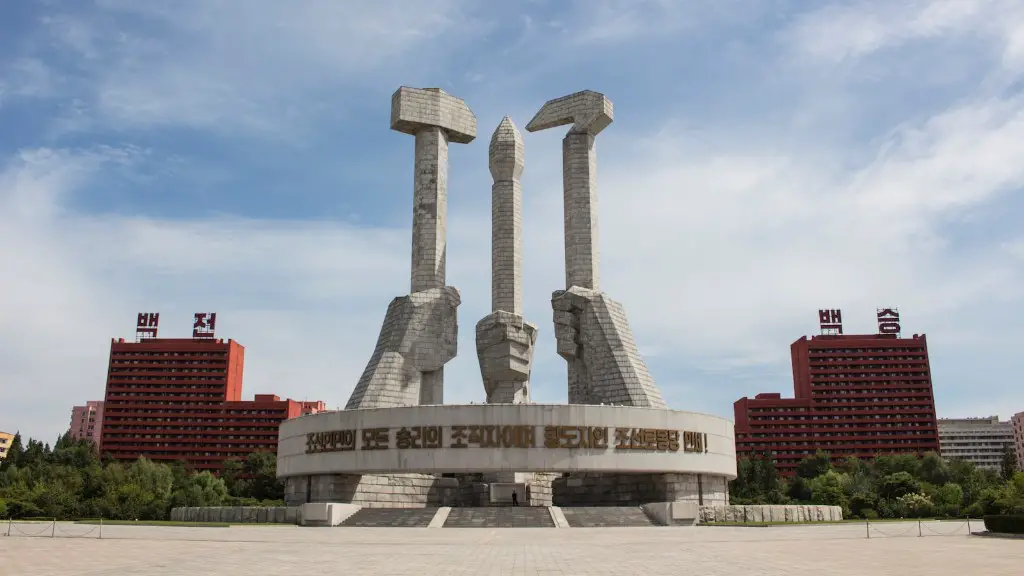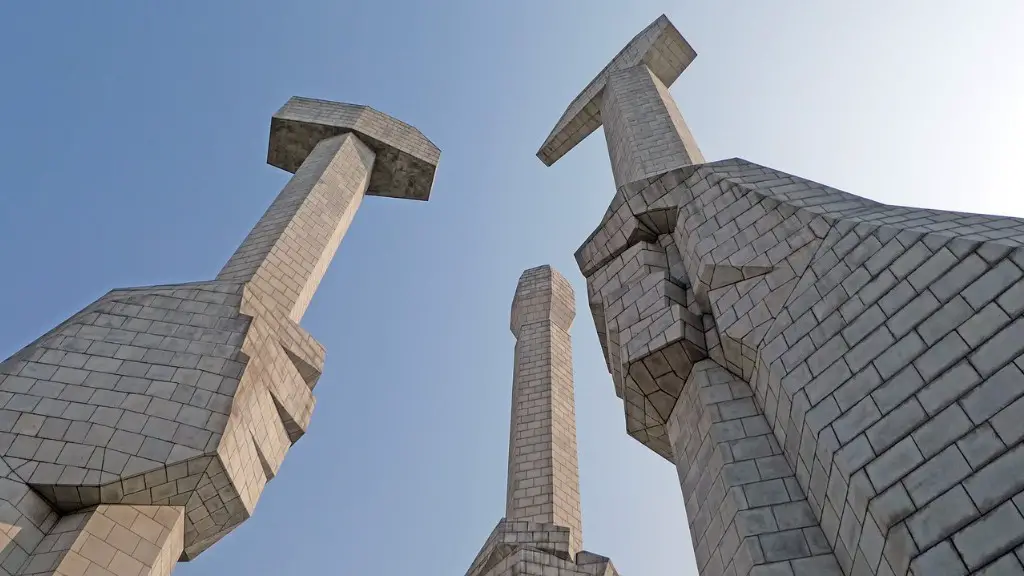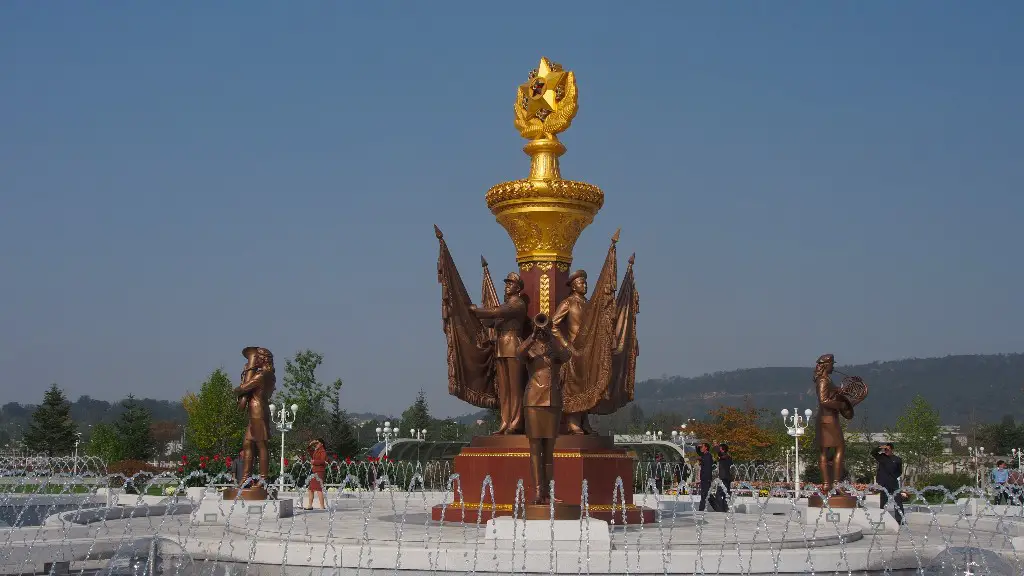The behavior and attitude of North Korea towards the outside world is often seen as mean and hostile.Their leaders seem to limit their engagement in global affairs to only asserting their national power and diplomatic muscle,but the reasons for why North Korea is so mean remain unknown to many. The nation has been involved in numerous conflicts,it had nuclear weapon programs, their human rights record has been at the center of international condemnation and it maintains a lethal and oppressive regime against its own citizens.
To understand why North Korea is mean,it is important to understand its geopolitical position within the east Asian region.The nation is located between its more powerful neighbors,China and South Korea. It follows a policy of self-reliance and opposes any foreign influences.As a result,North Korea has remained fairly isolated from the rest of the world for much of its history,exhibitining a deep mistrust of outsiders and establishing a cult-like loyalty to its leadership.
It is also theorized that North Korea’s attitude and behavior could be attributed to its totalitarian ruling style,where power is concentrated in the ruling elite,and the citizens have no say in the decision-making process.This gives the country’s leaders immense authority and allows them to dictate policies that serve their interests,regardless of the implications it may have on its people.Moreover,the ruling party also places significant emphasis on the importance of maintaining a strong military and internal security apparatus in order to protect the nation’s interests and to suppress any internal dissent.
Experts in the field also pointed out that North Korea’s bellicose attitude and behavior have often been used as a way to domesticate a population which is deprived of civil liberties and basic human rights,and as a tool to deflect attention from the government’s oppressive policies.The nation’s relentless focus on security concerns has also been theorized as a way for their leaders to maintain power by distracting attention from their abysmal domestic record.It is also thought to be a way for the North Korean government to provide incentives to its population such as jobs in the defense-related industries,in exchange for their compliance and loyalty.
At the same time,the North Korean authoritarian state has also been using its intimidating behavior and aggressive rhetoric as a way to coerce other nations into providing much needed economic aid and assistance.The nation’s leaders know that international opprobrium will bring in aid,which can then be used to fund their campaigns and military machines.It is also thought that North Korea’s mean behavior is also motivated by its own sense of insecurity;it is often seen that the nation engages in aggressive provocations in an attempt to project its power and status in the global arena.
Economic Reasons
Economic issues also play a part in North Korea’s mean behavior.Due to its poorly developed economy,the nation is in a desperate need for international assistance and resources. As a result,the nation’s leaders often resort to blackmail and other coercive tactics to obtain the funds and materials it needs from other countries.Additionally, the nation’s dependence on China and its trading partners for resources has left North Korea in a position of vulnerability. This has resulted in further isolation and mistrust of the nation’s leadership.
The North Korean government also exploits the nation’s mean behavior as a way to gain prestige and legitimacy in its international interactions.By engaging in belligerent rhetoric and aggressive military posturing,the nation’s leaders seek to project their nation as a powerful and independent state.This has enabled the nation to gain an increased influence in the international community,even though it remains isolated from much of the world.
Furthermore,North Korea’s mean behavior also serves to strengthen internal unity and prevents further fragmentation of the nation’s population.It can be argued that the nation’s hostile posture reinforces the narrative of the nation’s leaders being the only ones capable of protecting the citizens from external influences and influences.
The Results
The result of North Korea’s mean behavior has been a tense relationship with the rest of the world and a general mistrust of the nation’s intentions.It has been observed that several diplomatic initiatives have failed due to the nation’s unwillingness to cooperate with the international community,and that it continues to engage in hostile behavior in order to project its power and protect its interests.However, some experts point out that North Korea’s attitude and behavior may sometimes be a response to certain external threats and pressures,such as those posed by China and South Korea.
In conclusion, it is clear that there are multiple reasons why North Korea is so mean.The nation faces a unique geopolitical position, internal and external security concerns, and the need to retain its power and influence within the international community.Economic issues and a reliance on other countries have also forced the nation’s leaders to resort to coercive tactics and have resulted in further isolation. Meanwhile, North Korea’s mean behavior is also seen as a way to maintain internal unity and rally support for its leaders.
Social Factors
Apart from the economic situation,North Korea’s mean behavior can also be attributed to its socioeconomic structure.The nation has one of the highest levels of income inequality in the world and the gap between rich and poor is rapidly increasing.As a result, the nation’s leaders often use their mean attitude and repressive policies as a way to maintain control over the population and maintain their grip on power.Additionally,North Korea’s oppressive regime,which includes strict censorship, restrictions on media and civil liberties, and regular violations of human rights,have lead to widespread discontent inside the nation and served to further fuel its mean attitude towards the international community.
Moreover,the nation’s absolute rule has resulted in a lack of dissenting voices to challenge its leaders and their chauvinistic policies. As a result, North Korea’s leaders have a strong sense of impunity,and can freely engage in hostile behaviors without fear of repercussions from their population.The lack of checks and balances has thus enabled North Korea’s leaders to become increasingly bold in their actions,ultimately resulting in North Korea’s mean behavior.
Propaganda
Finally,propaganda has played a major role in North Korea’s mean behavior. The nation’s leaders have often used the mass media to spread their message and to adhere to the nation state’s monolithic narrative. By portraying a hostile image of the nation’s enemies, North Korea’s leaders have been able to divert attention away from their oppressive policies and rally popular support in their favor.This has been a key factor in maintaining the nation’s isolationist policies,as well as its hostile attitude to the outside world.
In addition, North Korea’s leaders have also used their mean behavior as a way to instill a sense of unity among their population. By rallying the people against a common enemy,the North Korean government has successfully managed to galvanize the nation’s population and to divert attention away from the nation’s internal issues. This has enabled the nation’s leaders to remain in power and maintain the nation’s isolationist policies for much of its history.
International Community
Despite North Korea’s mean behavior,the international community has attempted to engage the nation in dialogue numerous times.However,these initiatives have often failed due to the nation’s unwillingness to cooperate and its insistence on pursuing its own agenda. This is largely due to the nation’s authoritarian ruling style and its strong sense of self-reliance. As a result, attempts to introduce meaningful change inside the nation have often been rejected by the nation’s leadership.
In response to North Korea’s mean behavior,several nations have imposed economic sanctions and diplomatic pressure on the nation. However, it has been argued that these efforts have not been successful in inducing meaningful reforms and have instead further strengthened the nation’s isolationist policies and its sense of mistrust towards the international community. Additional attempts to curb North Korea’s mean behavior through military intervention have also been met with hostility,and have not been successful in curbing the nation’s aggressive attitudes.
The international community has also sought to engage North Korea through cultural and humanitarian projects. These initiatives have sought to foster a sense of understanding and reconciliation between the nation and the rest of the world. While these efforts have seen some success in increasing communication and links between the two sides, North Korea’s mean behavior remains largely unchanged.
Outlook
Despite the lack of meaningful progress in addressing North Korea’s mean behavior, some experts have suggested that the nation’s leadership is slowly beginning to open up to the outside world. The nation has taken some steps to improve its relationship with its neighbors and has engaged in several diplomatic initiatives with the United States and other Western countries.While these efforts remain limited, they are seen as a sign of the nation’s growing readiness to engage with the international community.
The outlook for addressing North Korea’s mean behavior remains uncertain. However,it is clear that the nation’s authoritarian rulers remain committed to continuing their hostile policies and that the nation does not seem to be willing to change its stance in the near future. Thus,it is likely that in the foreseeable future, North Korea’s mean behavior will remain unchanged,and it will continue to remain isolated from the rest of the world.




